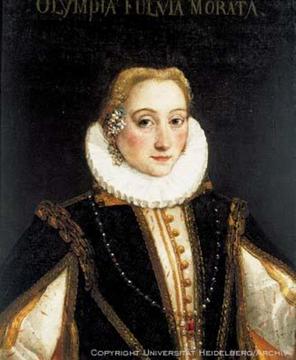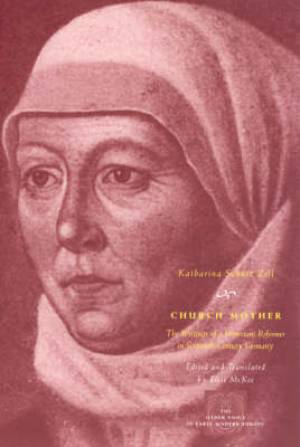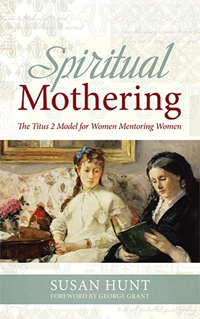
“WHAT shall thy praise resound ? bright child of song!
The classic lyre of Greece, which, swept by thee,
Woke deep Eolian echoes, slumbering long ?
Or thy own land’s soft lute, whose harmony
Breathed, all unconscious, from thy hand and heart
Not these ! For thou didst chuse that better part …”¹
Olympia, bright and esteemed lady of Ferrara – child protégé of divine favor, lover of languages and deepest learning, champion of Greek and Latin, teacher and companion of princesses, erudite woman of divine strength and gentle femininity, loving daughter, sister, wife, and faithful friend of budding believers and loyal protestants, devotee of Christ and elect of God’s grace – I was to capture your heart. But how?
How would I garner those rays of divine light that would help you to pit the truth that is in Christ against papal error? How could I seize a love so divinely intense that it would beg to dissolve superstitions; or a love of learning so deep that it would plunge you into the ever-liberating depths of God’s sacred scriptures and the works of convicted and enlightened hearts?
How could I embrace a life so replete with God’s perfect purposes that it would rob even your premature death of its fiery sting? How could I clasp the magnanimous beauty of providence at work in your halcyon days, to grow in you those seeds of grace that would help you to rise above all that is polished, distinguished, and highly esteemed? Or how could I capture that unconquerable grace that would ignite you to love God’s truth so fully, that all the pains and pleasures of this mortal life would melt into the imperishable treasures of trusting and learning Christ?
Olympia, may the pieces of your life and heart presented here help to awaken us from our comfortable slumber. I fear that our hearts, free of papal tyranny and free to partake of the riches of God’s Word, have grown smaller and colder in these our ‘happier’ days, in which our pursuit of leisure drowns the love of learning, where mounts of pleasures trump the quest for truth and holiness, and where our self-serving love and ego-exalting good deeds fill the many pages of our plasma screens and books.
May your story warn us that our cherished merriment, envied flatteries, and costly pleasures are fleeting, that they were never meant to last. Show us how quickly life can change from prosperity to peril and famine and war, and that our only hope is found in Christ alone and in the spreading of His gospel. May the bright galaxy of your virtue and talents teach us where our real hope lies; that it lies within the riches of His storehouse, endlessly replete with His wisdom, truth, and love – our ultimate peace.
Olympia, young lady of highest learning, let the many pages of your life speak of a wisdom not attainable by effort, but by the grace of God. Let the beauty of your female erudition rouse us to see that our safety lies not in what we know but in Whom we trust with all that we claim to have learned. Bid us to see that all of our accomplishments and talents are gifts of God’s own providence to be forever cherished and nourished in light of His eternal will and glory.
In the year of divine advantage, 1526, Ferrara welcomed you into its era of prosperity and splendor, of art and literature and deepest learning, and into that brief dawning that would stir the sleeping from their parish graves. It was into the ducal court of Ferrara, your home and seat of learning, that many enlightened converts found refuge under the protection of your kind duchess Renee, whose religious sympathy, cemented by great reformers such as John Calvin, helped to shape your heart as well.
Your mother Lucretia was a model of dignity and virtue who, by God’s perfect design, exhibited that strength of mind and principle that would later console her as she would learn of your departure, first from Ferrara in 1550, and then from life itself in 1555. Your father, Fulvio Pellegrino Morato, a distinguished professor at the ducal court of Este, and one of the first and finest supporters of the reformed tenet, was utterly devoted to foster your genius and love for God’s truth.
Olympia, your venerated brilliance was further illumined by your growing pious disposition and most engaging modesty. But little did you know, as you basked in the lauds of some of the most learned elite, that all their flatteries would one day turn to cold suspicions and their ultimate rejection because you were found increasingly fond of the very truth that threatened to undo their royal favors. Little did you know that your headstrong bent against papal authority and toward the divine, which you once rejected, would rescue you from that idolatrous Italy that would have been pleased to hang you with its flaunting honors.
God was steadily at work in that great literary and poetic atmosphere in which you matured into a most skilled and gifted writer. Little evidence was there in the midst of your erudite circles, that death and decay were already at work beneath the broad and sunny streets on which your delicate beauty roamed. Of all the things you knew, you could not have known that the holy scriptures, through which God poured that blessed truth that you could not resist, would clad you in an even lovelier garment — that blessed grace that outlasts the stench and decay of death itself.
Little did you know that the command of your pen would prove most useful in those anxious days where persecution, war, death, separation, and famine grew the strongest faith in you — a faith from which would flow the ink of your dearest persuasions to win the hearts and minds of misled men and women everywhere for the truth that is in Christ alone. How grateful you were for God’s provision of a husband whose love for learning was as deep and wide as yours, and for the grace that afforded you the means to pursue your private studies and gifts of writing and teaching for His glory.
You knew that the help and love of others, and the provisions and periods of peaceful rest were divine gifts of God to lend you that strength and empathy that would later help you to produce some of your most edifying works of endurance, hope, and suffering. Your princely confidence grew more and more selfless as your love and sympathy for others began to grow heavenward from your own tears and pains.
Your greatest wish for others was not what it once was, in the felicitous court of Ferrara, that they should gratify their desires and enjoy the pleasures of this world–their best life now. No! Your greatest wish for all, which your pen did prove again and again, was that they should also become partakers of that same eternal reward that was promised, in spite of fiercest persecutions, to all who put their trust in Christ, bend their hearts toward His grace, and employ all their minds to the diligent study of His Word.
How thankful was your heart, when it learned that it could outgrow even the grandest of palaces and dreams; when in your beloved’s Schweinfurt your finest works went up in flames along with all the hopes of that dear town. How diligent were your prayers for God’s grace to spare your dear husband from surest death. How pure was your praise of those strangers, those kindred in Christ, who would love you as a sister across the many war-ridden miles with their help to preserve and to publish those of your letters that God was pleased to spare and to use for His glory.
Olympia, long have you been loosed form the bands of this hard mortal life, and great is the rest and reward you’ve gained in Christ! These words, though spoken as if you could hear, can’t really reach your ears, now abounding in praises and glory alone for that great Grace and Love that forever was pleased to save you. But if you could, you’d quickly exhort us not to look to you but to the Hand of God alone, with which your legacy was written and without which it would only be a most sad and hollow fairy tale.
About the Author: Petra is a word enthusiast and writer-wannabe behind This Good Steward. English, her second language, has become a favorite excuse with which to express her many thoughts and opinions. Petra is married with two grown sons and two beautiful grandchildren. She and her husband live and love the small-town life near the foothills of NC, where they share the unfailing provisions of God, His love shed abroad in their hearts, His redeeming truth and forgiveness in Christ, a passion for the Doctrines of Grace, the simple pleasures of smiling, hiking, and music, and the more luxurious delights of eating out and kayaking.
Our friends at the Bible Truth Chat Room continue their corresponding series on women. Their topic today is the Institution of Marriage.
The next post in this series is Lady Jane Grey by Becky Pliego
Source:
¹ Olympia Morata: Her Times, Life and Writings, Arranged from Contemporary and Other Authorities (1834 Book)
Other Resources
Online:
Women in the Reformation by Emma Louise Parry
The Bulwark by Scottish Reformation Society
Olympia Morata: Her Life and Times by Robert Turnbull
Olympia Fulvia Morata /Olimpia (1526-1555)
Olympia Morata: Champion of the Reformation
In Print:
Morata, Olympia, 1526-1555; Parker, Holt N., transl., The Complete Writings of an Italian Heretic (Chicago: University of Chicago Press, 2003)





